【人教新目标版】2018年秋八年级英语上册Unit1Wheredidyougoonvacation复习同步练习含答案
2018年秋人教新目标版八年级上册英语 Unit 1 备课综合(教案+课时作业+课件+单元测试 (15)
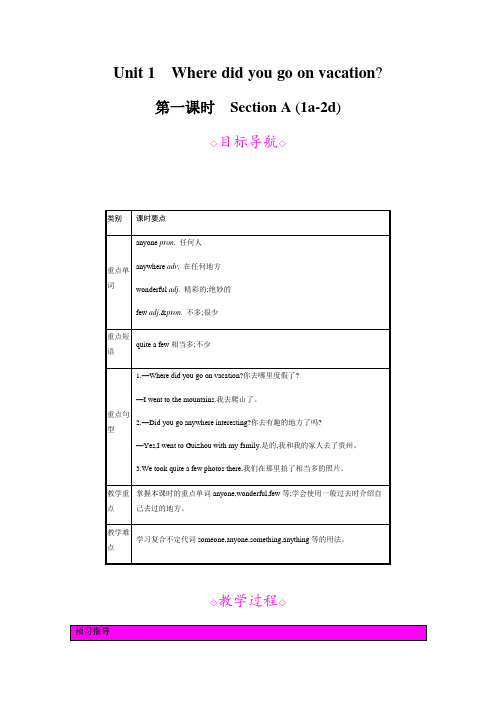
Unit1Where did you go on vacation?第一课时Section A (1a-2d)◇目标导航◇◇教学过程◇一、方法指导预习教材Page 1~2,标注不认识的单词。
然后翻到生词表,通过读和写基本了解本课时的单词。
二、预习检测Ⅰ.汉译英1.任何人anyone2.在任何地方anywhere3.精彩的;绝妙的wonderful4.不多;很少few5.相当多quite a fewⅡ.根据句意及汉语提示完成句子1.Did you go shopping with anyone(任何人)?2.You can buy clothes like these anywhere(在任何地方).3.We had a(n) wonderful(精彩的) time in China.4.I have to buy a(n) few(不多) things at the shop.5.Helen took quite a few(相当多) photos of Huangguoshu Waterfalls.Step1情景导入Teacher:Hello,everyone.Your vacation was over.How was your vacation?What did you do?Where did you go on vacation?Did you go anywhere interesting?Who did you go with?Then do you know how to answer the questions with the Simple Past Tense?We will learn about it.Step2完成教材1a-1c的任务1.认真观察1a中的图片,将所给短语与图片的活动进行搭配,并大声朗读短语。
2.认真听录音,按你听到的顺序给图中的人物编号,核对答案并朗读对话。
人教新目标版英语八上Unit 1《Where did you go on vacation》(Sec
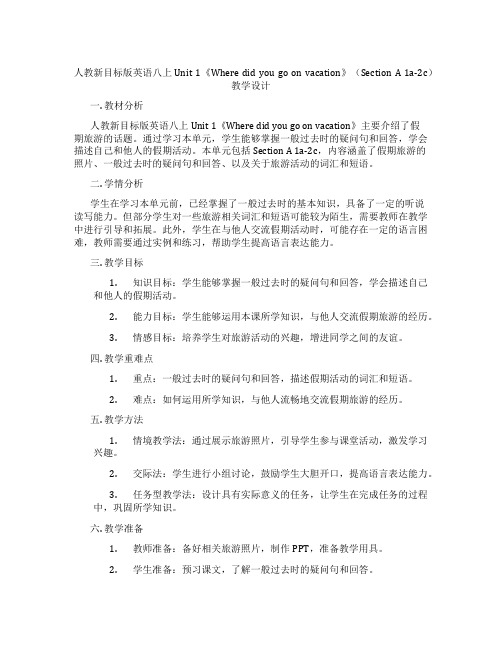
人教新目标版英语八上Unit 1《Where did you go on vacation》(Section A 1a-2c)教学设计一. 教材分析人教新目标版英语八上Unit 1《Where did you go on vacation》主要介绍了假期旅游的话题。
通过学习本单元,学生能够掌握一般过去时的疑问句和回答,学会描述自己和他人的假期活动。
本单元包括Section A 1a-2c,内容涵盖了假期旅游的照片、一般过去时的疑问句和回答、以及关于旅游活动的词汇和短语。
二. 学情分析学生在学习本单元前,已经掌握了一般过去时的基本知识,具备了一定的听说读写能力。
但部分学生对一些旅游相关词汇和短语可能较为陌生,需要教师在教学中进行引导和拓展。
此外,学生在与他人交流假期活动时,可能存在一定的语言困难,教师需要通过实例和练习,帮助学生提高语言表达能力。
三. 教学目标1.知识目标:学生能够掌握一般过去时的疑问句和回答,学会描述自己和他人的假期活动。
2.能力目标:学生能够运用本课所学知识,与他人交流假期旅游的经历。
3.情感目标:培养学生对旅游活动的兴趣,增进同学之间的友谊。
四. 教学重难点1.重点:一般过去时的疑问句和回答,描述假期活动的词汇和短语。
2.难点:如何运用所学知识,与他人流畅地交流假期旅游的经历。
五. 教学方法1.情境教学法:通过展示旅游照片,引导学生参与课堂活动,激发学习兴趣。
2.交际法:学生进行小组讨论,鼓励学生大胆开口,提高语言表达能力。
3.任务型教学法:设计具有实际意义的任务,让学生在完成任务的过程中,巩固所学知识。
六. 教学准备1.教师准备:备好相关旅游照片,制作PPT,准备教学用具。
2.学生准备:预习课文,了解一般过去时的疑问句和回答。
七. 教学过程1.导入(5分钟)教师展示旅游照片,引导学生谈论假期旅游的经历,激发学生对本课内容的兴趣。
2.呈现(10分钟)教师通过PPT展示课文1a-1c的内容,引导学生跟读,注意语音语调。
八年级英语上册Unit1Wheredidyougoonvacation讲义+习题(新版)人教新目标版
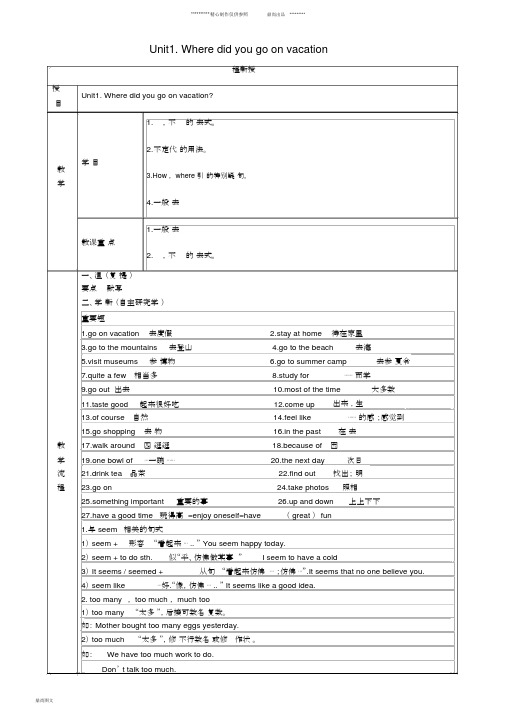
Unit1. Where did you go on vacation程新授授Unit1. Where did you go on vacation?目1.,不的去式。
2.不定代的用法。
学目教3.How , where 引的特别疑句。
学4.一般去1.一般去教课重点2.,不的去式。
一、温(复提)要点默写二、学新(自主研究学)重要短1.go on vacation去度假2.stay at home待在家里3.go to the mountains去登山4.go to the beach去海5.visit museums参博物6.go to summer camp去参夏令7.quite a few相当多8.study for⋯⋯ 而学9.go out 出去10.most of the time大多数11.taste good起来很好吃e up出来 ,生13.of course自然14.feel like⋯⋯的感;感觉到15.go shopping去物16.in the past在去教17.walk around四逛逛18.because of因学19.one bowl of⋯一碗⋯⋯20.the next day次日流21.drink tea品茶22.find out找出;明程23.go on24.take photos照相25.something important重要的事26.up and down上上下下27.have a good time 玩得高 =enjoy oneself=have( great ) fun1.与 seem相关的句式1) seem +形容“看起来⋯ .. ” You seem happy today.2) seem + to do sth.似“乎、仿佛做某事”I seem to have a cold3) It seems / seemed +从句“看起来仿佛⋯;仿佛⋯”.It seems that no one believe you.4) seem like⋯好.“像,仿佛⋯ .. ” It seems like a good idea.2. too many, too much , much too1) too many“太多”,后接可数名复数。
最新人教版新目标八年级上册英语《Unit 1 Where did you go on vacation》教学设计

Unit1 Where did you go on vacationSection B(1a-1e)一.教学目标知识目标:1.key words: delicious,exciting,terrible,expensive,cheap,boring2.key sentences:(1)Where did Lisa go on vacation?(2)Did she do anything special there?Did she buy anything for her best friend?Did Lisa like her vacation?(3)How was/were...?3.运用be+形容词来评价事物能力目标:1.进行听力训练,提高综合听说能力。
2.能够利用自评和互评的评价标准,提高自己的听说能力。
情感目标:1.让学生学会分享过去发生的事件。
2.通过课堂活动,培养学生的合作精神。
3.向学生提供体验学习成功的多种机会,使其增强自信心。
学习策略:1.听力练习,训练学生学习和使用有选择的听的策略。
2.设计Pairwork, Groupwork等活动,培养和训练他们的合作策略。
3.通过自评和互评活动,使学生不断调整改进自己的学习策略。
文化意识:通过听力内容帮助学生了解香港。
二.教学重难点教学重点:The vocabulary:delicious,exciting,terrible,expensive,cheap,boringTarget language:Where did Lisa go on vacation?Did she do anything special there?Did she buy anything for her best friend?How was/were...?教学难点:1.熟练地谈论过去发生的事件2.运用be+形容词来评价事物三.教学过程Step 1Leading in1.Greetings.2.T:Where did you go on vacation?S:I went to summer camp.T:Did you do anything special there?S:Yes,I...T:Did you buy anything for your parents or friends?S:Yes,I bought...for.../No,I bought nothing.T:How was/were...?S:It was/They were...3.Present the adjectives:delicious,exciting,terrible,expensive,cheap,boring Step 2Pre-taskWork on 1a and 1b.1.Look at the six pictures.2.Match the words with the pictures.4.Check the answers.Step 3While-taskWork on 1c and 1d.1.Make students read the questions in 1c.2.Play the recording for the first time. And say:Listen to the tape. Lisa is talking about her vacation. Complete the four questions.①Where did Lisa go on vacation?She went to Hong Kong.②Did she do anything special there? What was it?__________________________________________________③Did she buy anything for her best friend?__________________________________________________④Did Lisa like her vacation?__________________________________________________3.Play the recording a second time. Students complete the task in 1d.What did Lisa say about ------?her vacation great the people ________the fun park ________ the food ________the stores __________4.Correct the answers.5.Ask the students to listen to the tape and repeat .Then let them read the tape scripts.Step 4Post-taskWork on 1e.1.Pairwork. Get the students to work in pairs about Lisa's vacation. You canbegin your questions with:Where did...?What did...?Did she...?How was...?How were...?2.Ask 3 or 4 students to ask and answer the questions .For example:A: Where did Lisa go on vacation?B: She went to Hong Kong.A: What did she do?B: She went to a fun park.A: Did she go shopping?B: Yes, she did.A: How were the stores?B: They were very expensive.A: How were the people?B: They were really friendly.A: How was the food?B: It was delicious.3.Groupwork. Let the students say about Lisa's vacation . First give the students time to practice it by themselves. Then let them work in groups .At last choose several students to show it individually.For example:Lisa went to Hong Kong with her family on vacation. She went to a fun park. It was really exciting. She bought something for her best friend. The stores were very expensive. The people there were really friendly. Lisa’s parents have some friends there.They had dinner at their friends ’ home. The fo od was delicious. Everything was excellent. And they had a good time.Step 5. Exercises一..根据括号所给单词,句意或首字母完成句子。
八年级英语上册 unit 1 where did you go on vacation(短语+句型+练习)(新版)人教新目标版
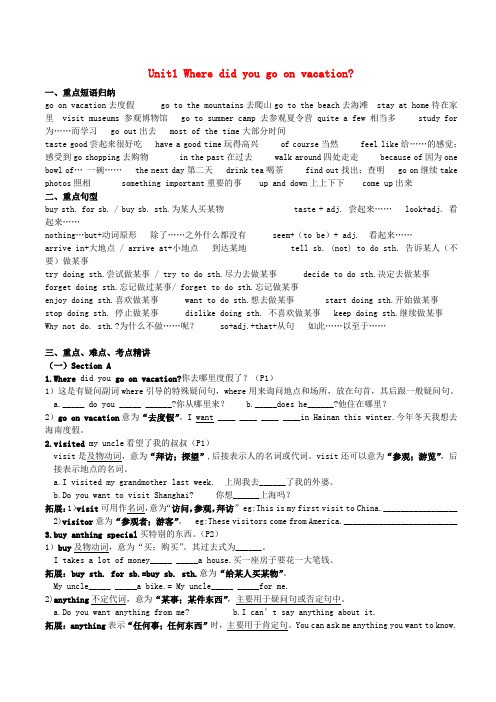
Unit1 Where did you go on vacation?一、重点短语归纳go on vacation去度假 go to the mountains去爬山go to the beach去海滩 stay at home待在家里 visit museums 参观博物馆 go to summer camp去参观夏令营quite a few相当多 study for 为……而学习 go out出去 most of the time大部分时间taste good尝起来很好吃 have a good time玩得高兴 of course当然 feel like给……的感觉;感受到go shopping去购物 in the past在过去 walk around四处走走 because of因为one bowl of…一碗…… the next day第二天 drink tea喝茶 find out找出;查明 go on继续take photos照相 something important重要的事 up and down上上下下 come up出来二、重点句型buy sth. for sb. / buy sb. sth.为某人买某物 taste + adj. 尝起来…… look+adj. 看起来……nothing…but+动词原形除了……之外什么都没有 seem+(to be)+ adj. 看起来……arrive in+大地点 / arrive at+小地点到达某地 tell sb. (not) to do sth. 告诉某人(不要)做某事try doing sth.尝试做某事 / try to do sth.尽力去做某事 decide to do sth.决定去做某事forget doing sth.忘记做过某事/ forget to do sth.忘记做某事enjoy doing sth.喜欢做某事 want to do sth.想去做某事 start doing sth.开始做某事stop doing sth. 停止做某事 dislike doing sth. 不喜欢做某事 keep doing sth.继续做某事Why not do. sth.?为什么不做……呢? so+adj.+that+从句如此……以至于……三、重点、难点、考点精讲(一)Section A1.Where did you go on vacation?你去哪里度假了?(P1)1)这是有疑问副词where引导的特殊疑问句,where用来询问地点和场所,放在句首,其后跟一般疑问句。
2018年秋八年级英语上册 Unit 1 Where did you go on vacation教案 (新版)人教新目标版
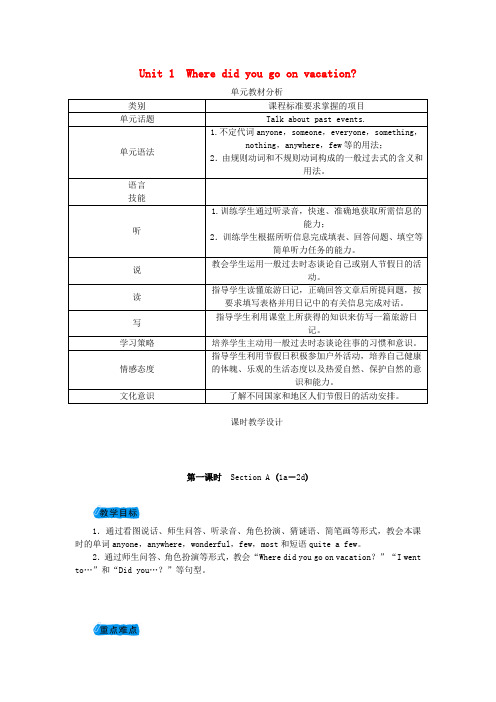
Unit 1 Where did you go on vacation?课时教学设计第一课时Section A (1a-2d)1.通过看图说话、师生问答、听录音、角色扮演、猜谜语、简笔画等形式,教会本课时的单词anyone,anywhere,wonderful,few,most和短语quite a few。
2.通过师生问答、角色扮演等形式,教会“Where did you go on vacation?”“I went to…”和“Did you…?”等句型。
2重点让学生学会描述自己假期所进行的活动。
难点学会用一般过去时态描述过去发生的事情;掌握不定代词的用法。
Step 1 情景导入通过师生自由交际进行复习与热身。
让学生回忆曾经学过的与假期活动相关的词汇。
例如:stay at home, go to the mountains, go to New York City, go to the beach, go to summer camp …。
通过师生谈论自己假期所做的事情,调动学生对本课时话题的学习兴趣,从而达到巩固已学知识的目的,同时实现新旧知识的衔接。
For example :T :Do you like playing basketball? S :Yes!T :So do I. Do you want to play basketball?S :OK. After class we'll play it on the playground. T :Do you usually stay at home on vacation? S :No ,I don't. I usually go to the mountains. …(设计意图:本环节旨在通过“头脑风暴”进行课前热身,让学生打开记忆的大门,快速激活已有的知识库存,为下一环节的学习奠定基础。
同时,快速复习也可以激发学生的学习欲望,让学生敢于开口表达,增强学习的信心。
人教新目标八年级上册英语:Unit 1 Where did you go on vacation?S
Unit 1 Where did you go on vacation?Name Group ClassPeriod 3Revision【Topic 】Holidays and vacations.【Get ready before class 】Section A 知识回顾阅读范例又是如何组织的呢?我们来回顾一下:谈论过去:1.—When did you go on a vacation?—I went to the mountains. 2.—Did you go with anyone? —Yes ,I went with my mother.Jane ’s diary entriesOn MondayOn TuesdayArrived in Penang in Malaysia went to the beach tried paragliding had Malaysian yellow noodles for lunch road bicycles to Georgetown saw the houses of Chinese traders from 100 years ago enjoyable !Went to Penang Hill wanted to walk up to the top but it rained took the train got to the top and were wet and cold couldn't see anything below because of the bad weather only had one bowl of rice and some fish great !温故知新:单选1.— ______ is a nationwide population census (全国人口普查) held?—Once every ten years.A.How many B.How much C.How often D.How long 2.Which of the following can make Tom healthy?A.Doing homework. B.Playing basketball.C.Eating many French Fries. D.Getting up late.3.Although he is very old,______ he works very hard.A.so B.but C.and D./4.______ the computer,I surf the Internet once a week.A.As for B.As in C.As from D.As o f 5.You look ______ your twin brother.A.same as B.same like C.the same as D.the same like6.—How often do you call your pen pal? —______.A.For a week B.In a month C.About two weeks D.Once a week 7.Lily ______ listens to music in the evening.A.sometime B.sometimes C.some time D.some times 8.Here ______ the results ______ the student activity survey.A.is;with B.are;of C.is;of D.are;with【Enjoy in class】完形填空What should we do to __1__ healthy?One important rule is to exercise every day.The King family try to __2__ every day.Mr. King __3__ exercise in the morning __4__ he must get to his office before seven o'clock,so he runs every evening.Mrs. King likes sports,__5__.She walks to work every day and after work she plays different __6__ with her friends. She likes yoga (瑜伽) very much and she goes to yoga class __7__.Bob,their __8__,also loves sports. He often goes to school __9__.His favorite sport is__10__.He wants to be a famous player like Lin Dan.( )1.A. keep B.make C.do D.need( )2.A. exercise B.swim C.skateboard D.walk( )3.A. may not B.must not C.can not D.should not ( )4.A. but B.and C.although D.because( )5.A. also B.either C.again D.too( )6.A. sports B.games C.basketball D.ping pong( )7.A. in two weeks B.after two weeks C.twice a week D.for two weeks ( )8.A. friend B.son C.daughter D.teacher( )9.A. by bus B.on foot C.by taxi D.by car( )10.A. running B.basketball C.badminton D.soccer阅读理解Sports can help us a lot. Taking exercise can make us strong. In collective (集体的)sports like basketball,volleyball,or football,we will learn the importance of cooperation. And sports can also help us relax after work or study.However,as the saying goes,“There are two sides of everything.”Sometimes we may hurt other players or ourselves if we are not careful enough when participating (参加) in sports activities. What's more,too much or hard practice can be bad for our health.Sports can make us healthy both physically and psychologically (心理地).It is also a good way for people to know each other and can improve friendship between people. So long as we are careful enough,sports can do us nothing but good.( )1.______ can make us strong.A.Taking exercise B.Singing C.Sleeping D.Makin g friends( )2.Too much exercise can be ______ for us.A.good B.bad C.helpful D.enough( )3.Sports can ______.A.help people to know each other B.improve friendship between peopleC.do us nothing but good if we're careful D.All of the above.( )4.Which of the following is NOT true?A.Basketball and volleyball are both collective sports.B.Sports can help us relax after work or study.C.Sometimes we may hurt other players or ourselves when participating in sports activities.D.Sports can only make us healthy physically.( )5.The best title for this passage can be “______”.A.Sports and health B.Everybody must do sportsC.Sports are nothing to people D.No one likes sports。
人教版新目标八年级上册英语unit1 Where did you go on vacationSection全单元课时作业设计(含答案)
八年级上册英语unit1 Where did you go on vacation?Section A(1a-2d)课时作业一、翻译下列短语。
1.去度假2.待在家里3.去爬山4.去海滩5.参观博物馆6.去参观夏令营7.相当多8.为……而学习9.大部分时间二、完成下列句子。
1.你假期去哪里了?did you?2.我去山区了。
I the mountains.3.你和别人一起去的吗?Did you?4.你复习备考了吗?Did you ?5.你买了什么特别的东西吗?Did you buy ?6.我大部分时间只是待在家里读书休息。
I just stayed at home most of the time .三、单项选择。
1. My friends went to summer campvacationA. atB. onC. inD. after()2. -Did they clean the house yesterday?- .They cleaned it at five.A. No, they don tB. Yes, they doC. No, they didn’tD. Yes, they did3. I'm really in a hurry. I’ve gotto do.A something importantB important somethingC.anything importantD.important anything4. - Have you ever been to Shanghai?-Yes. Ithere a few months ago.A. have beenB.wentC. have goneD.goes()5.-did you go on vacation?-I went to summer camp.A. WhatB. WhereC. HowD. When四、完成句子1.-你去了哪里度假?-我去了组约。
人教新目标八年级上册英语《Unit 1 Where did you go on vacation?》
人教新目标八年级上册英语《Unit 1 Where did you go on vacation?》Section A_教学设计3一. 教材分析人教新目标八年级上册英语《Unit 1 Where did you go on vacation?》Section A,主要讲述了假期旅游的话题。
通过本节课的学习,学生能够掌握一般过去时的提问和回答方式,学会使用“Where did you go?”, “What did you do?”等句型来询问别人的假期经历。
教材内容丰富,插图生动,有助于激发学生的学习兴趣。
二. 学情分析八年级的学生已经掌握了基本的英语语法知识,对一般过去时有所了解。
但在实际运用中,可能还存在一定的困难。
学生的词汇量和对英语文化的了解有限,需要通过大量的操练来提高运用所学知识进行交际的能力。
三. 教学目标1.知识目标:学生能够掌握一般过去时的提问和回答方式,学会使用“Where did you go?”, “What did you do?”等句型来询问别人的假期经历。
2.能力目标:学生能够在日常生活中,运用所学知识进行简单的交流。
3.情感目标:通过本节课的学习,学生能够增进与同学之间的友谊,分享彼此的假期经历,培养对英语学习的兴趣。
四. 教学重难点1.重点:学生能够掌握一般过去时的提问和回答方式。
2.难点:学生能够在实际情景中,灵活运用所学知识进行交际。
五. 教学方法采用任务型教学法,通过创设情境,引导学生参与课堂活动,充分调动学生的积极性和主动性。
在教学过程中,注重师生互动,生生互动,让学生在实践中学习,提高语言运用能力。
六. 教学准备1.教师准备:准备好相关的教学材料,如PPT、图片、卡片等。
2.学生准备:学生提前预习教材内容,了解一般过去时的基本用法。
七. 教学过程1.导入(5分钟)通过展示一些假期旅游景点的图片,引导学生谈论自己的假期经历,引出本节课的主题。
2.呈现(5分钟)教师通过PPT展示本节课的主要句型:“Where did you go?”, “What did you do?”等,同时给出相应的回答,让学生感知和理解这些句型的用法。
2018年秋八年级英语上册 Unit 1 Where did you go on vacation教案 (新版)人教新目标版
Unit 1 Where did you go on vacation?课时教学设计第一课时Section A (1a-2d)1.通过看图说话、师生问答、听录音、角色扮演、猜谜语、简笔画等形式,教会本课时的单词anyone,anywhere,wonderful,few,most和短语quite a few。
2.通过师生问答、角色扮演等形式,教会“Where did you go on vacation?”“I went to…”和“Did you…?”等句型。
重点让学生学会描述自己假期所进行的活动。
难点学会用一般过去时态描述过去发生的事情;掌握不定代词的用法。
Step 1 情景导入通过师生自由交际进行复习与热身。
让学生回忆曾经学过的与假期活动相关的词汇。
例如:stay at home, go to the mountains, go to New York City, go to the beach, go to summer camp…。
通过师生谈论自己假期所做的事情,调动学生对本课时话题的学习兴趣,从而达到巩固已学知识的目的,同时实现新旧知识的衔接。
For example:T:Do you like playing basketball?S:Yes!T:So do I. Do you want to play basketball?S:OK. After class we'll play it on the playground.T:Do you usually stay at home on vacation?S:No,I don't. I usually go to the mountains.…(设计意图:本环节旨在通过“头脑风暴”进行课前热身,让学生打开记忆的大门,快速激活已有的知识库存,为下一环节的学习奠定基础。
同时,快速复习也可以激发学生的学习欲望,让学生敢于开口表达,增强学习的信心。
- 1、下载文档前请自行甄别文档内容的完整性,平台不提供额外的编辑、内容补充、找答案等附加服务。
- 2、"仅部分预览"的文档,不可在线预览部分如存在完整性等问题,可反馈申请退款(可完整预览的文档不适用该条件!)。
- 3、如文档侵犯您的权益,请联系客服反馈,我们会尽快为您处理(人工客服工作时间:9:00-18:30)。
Unit1Where did you go on vacation?一、单项选择1.—Did you have a sports meeting yesterday?—No,we didn't.It was put off________the heavy rain.A.instead of B.because ofC.as for D.across from2.—Who cleaned the blackboard yesterday,Dick?—John________.A.clean B.does C.did D.is3.He ran and ran,but he could n't run________to catch the bus.A.fast enough B.e nough quickC.enough fast D.enough quickly4.Don't worry.There is________wrong with the TV set.It's only because of the power cut.A.something B.nothingC.anything D.everything5.He doesn't feel like________anything today.A.to eat B.Eating C.eat D.eats6.The Rio2016Olympic torch(火炬)began______95day journey in Brazil on May3rd.A.it B.its C.it's D.its elf7.If we just think about________,the boat of friendship will be overturned anytime.A.myself B.himself C.yourself D.ourselves8.When summer comes,a lot of peop le feel like________to have fun.A.to swim B.swimC.swimming D.have swum9.We all________how he made such great progress in a short time.A.believe B.wait C.decide D.wonder10.—Come here.I'll tell you________about your study.—OK,we're coming.A.anything important B.something importantC.import ant anything D.important something11.—Hi.________—Yes.It's been a long time.A.Long time no see.B.How are you?C.How do you do?D.Nice to see you.12.When our teacher heard of the news,he was too angry to say________.A.everything B.nothingC.something D.anything13.Please________who broke the window.A.find out B.look C.look for D.look out14.I decided________in Beijing.A.live B.to live C.lives D.lived15.________ideas can make________.A.Difference;differenceB.Different;a differenceC.Differently;differentD.Difference;differently二、完形填空1American families like to have a2in summer.Summer is a good season for vacation. It is often hot in July and August.Children do not go to school during these two months.Some families enjoy3at home during the holiday.They work in the garden,visit friends, 4books or watch TV.Many families take their lunch to a park or a place5many trees or a nice lake.Some people like going to the beach.They can fish,swim or6the sun there.America is a large country.Some people have7time and money to travel to other countries like France,Japan and Australia.Many old8are still there.Many families travel by car or by train to see interesting places in their own countries.Not everyone9to go to busy cities.Because there are10people and cars there. So some families travel to mountains or beautiful valleys(山谷).1.A.Much B.A little C.A lot D.Most2.A.rest B.vacation C.party D.drink3.A.stay B.stays C.staying D.to stay4.A.see B.watch C.look D.read5.A.to B.in C.with D.for6.A.dislike B.enjoy C.hate D.buy7.A.a lot B.few C.little D.enough8.A.buildings B.build C.building D.built9.A.like B.likes C.dislike D.dislikes10.A.too much B.much too C.too many D.many too三、阅读理解ABill had a great day last Sunday.He visited his uncle in Beijing with his parents.In the morning, they took a bus there.His uncle met them at the bus station.His uncle and his cousin Nancy were glad to see them.After a quick breakfast in a restaurant,his uncle took them to the Summer Palace (颐和园)first.Then they went to Tian’anmen Square(天安门广场).They took some photos there. It was fin e and kind of hot.They were all a little tired,so they had some drinks and took a rest. It was rainy in the afternoon.They went shopping.In the evening,they saw Beijing Opera.Bill didn’t mind it.His parents said it was great.1.Who did Bill go to Beijing with?A.His uncle.B.His aunt.C.His parents.D.His cousin.2.Bill got to Beijing__________.A.by planeB.by busC.by carD.by train3.They went to the Summer Palace__________.A.in the morningB.in the afternoonC.in the eveningD.before breakfast4.What did Bill think of Beijing Opera?A.He didn’t like it.B.He liked it very much.C.He couldn’t stand it.D.He didn’t mind it.5.From the passage we know__________.A.Bill has many cousinsB.it was rainy that morning in BeijingC.they took some photos at Tian’anmen SquareD.they went to a movie in the eveningBSuggestions for travellingDon’ts Dos•Spit(吐痰)or drop litter everywhere.•Talk loudly on your mobile phone.•Take off your shoes on planes,trains or buses.•Smoke in public places.•Cut in line.•Cross the street when the red light is on.•Write graffiti(乱画)anywhere.•Just go shopping.•Talk politely to strangers.•Wash your handsbefore eatingand eat quietly.•Try to speak some of the locallanguage even if you can only say“Hello”and“Thank you”.•Visit local sights,tastelocal food and try to under-standother people’s lives in newplaces.根据短文内容判断正(A)误(B)。
